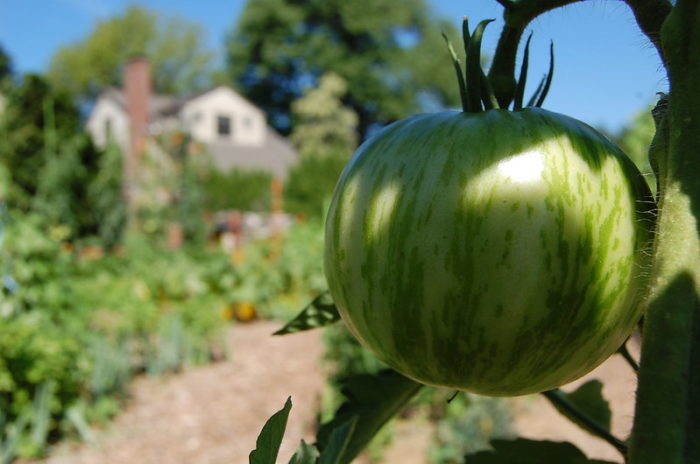Alena McNamara
THBG Librarian
Earth Day started fifty years ago, in 1970, and what better way to celebrate its anniversary than with New England Botanic Garden at Tower Hill? While the garden itself isn’t fifty years old yet–it began in 1986–THBG’s parent organization, Worcester County Horticultural Society, has been around that long and longer. WCHS incorporated in 1842, splitting off from the Worcester County Agricultural Society to focus on gardening concerns. As sustainability is one of New England Botanic Garden at Tower Hill’s present-day values, this is a perfect time to look back at where that first sprouted in our history.
While the first Earth Day in the spring of 1970 is not mentioned in the March/April 1970 issue of the WCHS newsletter Grow With Us, the newsletter does bring up environmental concerns in the form of the then-new Massachusetts ban on “hard pesticides” like DDT, found to cause cancers and other damage as detailed by Rachel Carson in her 1962 book Silent Spring.
The WCHS newsletter explains that these pesticides “fail to break down quickly [into] harmless components,” and as a result “unknown damage has and is being done to the chain of life. At last the general public is becoming concerned with the ever increasing pollution and hopefully will react vigorously. YOU can help by doing your small share.” To help members do their “small share,” the Horticultural Society collected hard pesticides from them to dispose of safely.
The following spring, WCHS hosted a talk by Dr. John A. Naegele from the Waltham Field Station, part of the UMass Extension Service, “on the question on everyone’s mind today – pollution of our air, land and water and the importance of living plants in its control.” At the time, WCHS only hosted one talk a month and most focused on specific types of plants or nuances of gardening techniques, but this subject was of enough interest to take up one of the slots.
WCHS also started thinking about environmental concerns in a broader sense than only pollution during the 1970s. Among its many other effects, the 1973 oil crisis made it hard for gardeners to get plastic plant pots, because plastic is a petroleum product. This spurred WCHS president Palmer Bigelow Jr. to muse in his winter 1974 Message from the President that a replacement pot made of pressed newspaper “disintegrates (is biodegradable) when planted, which is an added benefit.” Remarking how much heat greenhouses absorb even in winter, Bigelow foreshadows decades of solar panel research in saying, “Let’s ask our engineers for a practical way to store that surplus heat we have when the sun’s out.”
He goes on to recommend we find ways to “stop wasting so much water, electricity, food and everything else we use in our everyday lives.” Reduce, reuse, recycle!
Since New England Botanic Garden at Tower Hill itself started, WCHS has had the opportunity to display sustainable horticultural techniques through the gardens and their tending. Joann Vieira, long-time Director of Horticulture and Facilities at New England Botanic Garden at Tower Hill, wrote in the spring 2014 Grow With Us about our “commitment to responsible and environmentally friendly practices — practices that have been the backbone of our stewardship since our earliest days.” She details everything from lawn care to weeding and compost. These low-fertilizer, integrated management techniques likely have more in common with early WCHS members’ gardens than the gardens
of the mid-20th century. Our history allows us a long view of sustainability, working with the land in Worcester County since 1842.
Given these strong connections between gardening, environmentalism, and sustainability, it’s fitting to celebrate Earth Day’s 50th anniversary with New England Botanic Garden at Tower Hill! Even though only our gardeners and facilities staff can be on site right now to care for our plants and buildings, we all can take inspiration from the earlier decades of WCHS and enact sustainable practices in our own lives. Let’s all do our “small share” for the planet this Earth Day.
Interested in reading more? These and more past WCHS and THBG newsletters are up online.

